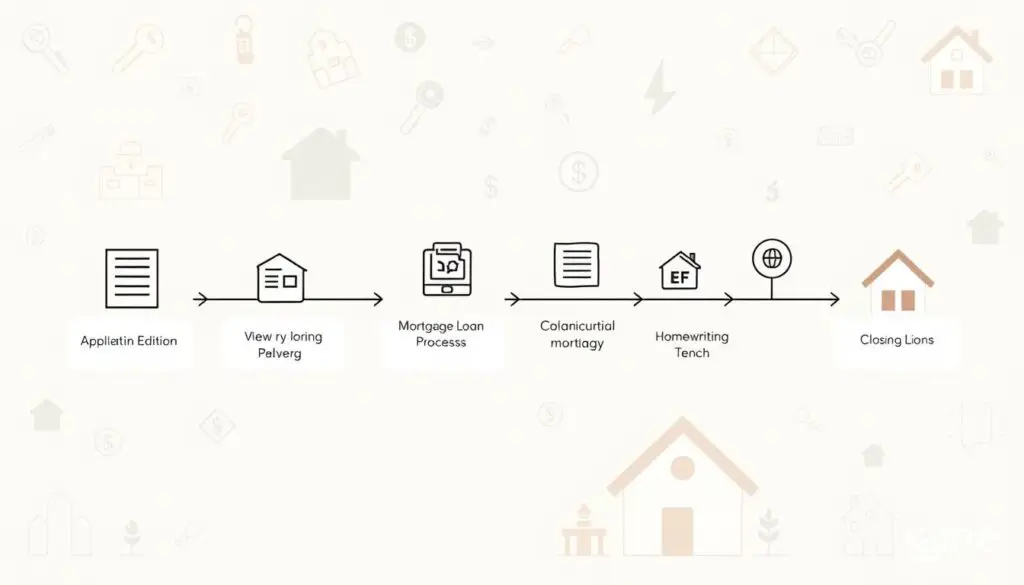As we step into the realm of homeownership, we recognize the challenges that first-time homebuyers face in today’s U.S. housing market. With mortgage rates at their peak in nearly a quarter-century, and housing prices reaching unprecedented heights, not to mention the scarcity of affordable housing, it’s never been more important to approach the home buying process with precision and strategy. Our journey toward purchasing our first home demands detailed research and organization to ensure we move from hopeful first-time homebuyers to proud homeowners with as few hurdles as possible.
To navigate these tumultuous waters, let us delve into financial introspection, weighing our mortgage choices, and seeking out the expertise of real estate professionals. Each step we take should be deliberate and informed, keeping us aligned with the goal of finding a place we can call our own. Understanding the essentials of the home buying process will be our guiding star as we seek out the pathway to affordable housing and ultimately to our dream home.
Key Takeaways
- Acquire knowledge of current mortgage rates and the impact on the home buying process.
- Dedicate time to thoroughly research and understand the U.S. housing market.
- Approach the home buying process with a solid financial plan and realistic budgeting.
- Explore various mortgage options to ensure affordability and suitability.
- Leverage the advice of real estate experts for guidance towards finding affordable housing.
- Commit to informed decision-making for a successful first-time homebuying experience.
Understanding the Current U.S. Housing Market for First-Time Homebuyers
The journey into homeownership can be intricate, particularly for those stepping into the U.S. housing market for the first time. Current trends indicate a mix of high mortgage rates coupled with progressively rising home prices, setting a challenging stage for first-time buyers. However, with insightful planning and understanding of Mortgage Loans, Closing Costs, and the role of Real Estate Agents, navigating this landscape is feasible.
It’s vital for potential buyers to equip themselves with knowledge about various financial aspects that influence their purchasing power. Mortgage loans, for instance, are a significant factor, often influenced by the broader economic environment, that can determine the affordability of monthly payments. Moreover, being aware of closing costs—which can include fees for inspections, legal paperwork, and real estate agents—ensures that buyers are not caught off guard financially.
Real estate agents play a pivotal role by offering expertise and guidance through the complexities of market trends, home listings, and the negotiation process. Their insights are particularly valuable in helping buyers understand which areas of the market offer the best value for their investment and how to strategically approach an offer.
We advise all first-time homebuyers to start by thoroughly assessing their financial situation, setting a realistic budget, and understanding all potential costs involved. The right real estate agent can be a crucial ally in ensuring that you find a home that meets your needs without overspending, ultimately leading to a successful and smart investment in your future.
Key Takeaways:
- Invest time in understanding current mortgage rates and how they affect your buying power.
- Account for all closing costs to avoid unexpected financial burdens.
- Collaborate with a knowledgeable real estate agent to navigate the market effectively.
Checking and Improving Your Credit Score
Ensuring a strong credit score is crucial for accessing better mortgage terms and understanding its impact is the first step toward effective homeownership preparation. At its core, managing your credit involves constant vigilance and understanding of how credit affects various financial opportunities, including securing down payment assistance. Let’s delve into the essentials of maintaining and enhancing your credit scores to unlock the best conditions for purchasing your first home.
Pull Your Credit Reports
Begin by obtaining your credit reports from major bureaus like Equifax, Experian, and TransUnion. This initial step is important for identifying any discrepancies that might affect your credit scores adversely. Incorrect information can often appear on your report; therefore, ensuring all personal and financial details are accurately recorded is imperative to establishing a solid foundation for your homeownership journey.
Monitor Your Credit Utilization Ratio
One of the most influential factors in your credit scoring is the credit utilization ratio. Our advice is to maintain your credit utilization rate below 30%. This demonstrates to creditors that you manage your credit responsibly without maxing out your available credit. This discipline is essential not only for maintaining good credit scores but also in reinforcing your qualifications for down payment assistance programs, which often favor applicants who exhibit financial prudence.
Fix and Monitor Your Credit Scores
Regular monitoring and fixing of your credit scores are key in ensuring you are always ready for the next step in your home buying process. Take advantage of free credit monitoring services, which can alert you to changes in your credit report, allowing you to address issues promptly. Engaging in regular homeownership counseling can also provide you with tailored strategies to enhance your credit health and financially prepare for acquiring your home.
Understanding and improving your credit score is a dynamic process that requires commitment and awareness of various financial factors that impact your scores. With careful planning and strategic action, you can enhance your creditworthiness, positioning yourself favorably for the home buying process.
Creating a Realistic Budget for Home Buying
Embarking on the home buying process begins with establishing a realistic budget that secures a financially sustainable future. When we look into Mortgage Loans and other costs associated with acquiring property, the need for precise budget planning becomes evident.
Contributing significantly to the discussion on affordable housing, financial experts suggest that a comprehensive home budget should not only cover the mortgage but also include various other ongoing expenses. These entail property taxes, homeowners insurance, and essential maintenance tasks, which often go underestimated when individuals first enter the home buying process.

To truly grasp the importance of a meticulously planned budget in the acquisition of affordable housing, we advocate the following steps for anyone looking to purchase their first or next home:
- Account fully for your income and expenditures to determine what you can realistically afford.
- Remember to include recurring but occasional costs like property taxes and annual insurance premiums.
- Set aside a reserve of 1% to 3% of the purchase price annually for repairs and maintenance, ensuring the longevity and value of your property.
This calculated approach allows for some flexibility in your budget, which is crucial during multiple-offer scenarios, enhancing your ability to secure a home within the competitive landscape of affordable housing. By aligning your financial strategy with your home buying aspirations, you lay a strong foundation for responsible homeownership, bolstered by well-structured mortgage loans.
We firmly believe that a well-prepared budget is the cornerstone of a successful home buying process, acting as your roadmap through one of life’s most significant financial decisions.
Assessing Needs Versus Wants in Your First Home
For first-time homebuyers, understanding the delicate balance between essential features and desirable extras in a home is key to a successful purchase. While affordable housing may suggest certain compromises, it is crucial to prioritize features that will significantly impact daily living and long-term satisfaction.
Before delving into the specifics, let’s consider the broader context. In today’s market, securing preapproval letters early in your home search isn’t just an advantage; it’s a necessity that real estate agents strongly recommend. This step ensures you have a clear understanding of your budget and how it aligns with your list of needs and wants.
Scouting Desirable Neighborhoods
Choosing the right neighborhood is as important as the home itself. As you scout potential areas, consider factors such as school districts, safety, convenience, and overall ambiance. An ideal neighborhood not only enhances life quality but also supports property value growth over time. Be aware that real estate agents are invaluable resources, well-acquainted with nuances that are not always evident to the average buyer.
Identifying Essential Features of Your First Home
The difference between ‘needs’ and ‘wants’ can often blur, but a focus on sustainability and efficiency can guide your decisions. For instance, energy-efficient appliances and smart home technologies are becoming staples in affordable housing, offering long-term savings and comfort.
| Feature | Essential | Desirable But Not Essential |
|---|---|---|
| Energy-efficient Windows | Yes | No |
| Modern Kitchen | No | Yes |
| Proximity to Public Transit | Yes | No |
| Home Office Space | Yes | No |
| Luxury Finishes | No | Yes |
This table reflects how different features can be categorized based on individual lifestyle needs and budget constraints, emphasizing that while luxury can wait, functionality and necessity should not be compromised in the pursuit of affordable housing.
Preparing Your Finances for the Home Buying Process
When stepping into the realm of homeownership, a crucial aspect is ensuring your financial health aligns with the demands of purchasing a home. This includes understanding the weight of mortgage loans, down payment assistance, and closing costs. We’ll discuss how to best prepare your finances to facilitate a smooth transition from prospective buyer to homeowner.
First and foremost, maintaining a comprehensive and detailed documentation of your income sources proves vital. Lenders are particularly keen on stable, consistent income when approving mortgage loans. It’s essential to demonstrate financial stability and reliable earnings over the last two years or more. This consistency reassures lenders of your ability to manage the recurring mortgage payments.
Equally important is managing your existing debts prudently. Prior to applying for a mortgage, ensure that you are not taking on new debts which could adversely affect your credit score. A lower credit score can significantly hinder your ability to secure favorable mortgage loan terms, impacting both interest rates and eligibility for down payment assistance programs.
- Review your credit report for inaccuracies and dispute them promptly.
- Keep your credit utilization low; ideally, it should be under 30% of your credit limits.
- Avoid major purchases that might necessitate taking out new loans or increasing your credit balance before securing your mortgage.
Another aspect to consider is the necessary cash for closing costs, which typically range from 2% to 5% of the home purchase price. These are upfront costs separate from your down payment and will need to be available at the time of closing on your home. Understanding these costs and budgeting for them from the start can prevent potential delays and stress during the final stages of home buying.
When considering down payment assistance, research local and federal programs that may apply to you. Such programs can significantly ease the financial burden by covering some or all of the initial down payment, allowing greater flexibility in your home buying options.
We recommend establishing a dedicated savings plan early in the process, specifically aimed at covering the down payment and closing costs. Regular contributions to this fund can secure the necessary amounts without financial strain as your home purchase approaches.
In conclusion, a well-prepared financial strategy that addresses these key areas will streamline your home buying process, making your transition into homeownership both successful and stress-free. By focusing on maintaining a robust credit score, limiting new debts, and planning for upfront costs, you optimize your financial readiness for obtaining the best possible mortgage loan and benefit from available down payment assistance.
Finding the Right Mortgage Loan for You
Embarking on the journey of homeownership begins with securing the right mortgage loan. With a plethora of options available, it’s crucial to navigate through this financial maze with precision and clarity. We aim to simplify the process, ensuring you make an informed decision that aligns with your financial goals.
Comparison Shop Mortgage Lenders
One of the first steps in securing a suitable mortgage loan is to comparison shop among different lenders. Each lender offers unique terms and rates, and it’s essential to find the one that best matches your financial situation. Real estate agents often have insights and may recommend lenders who have earned trust in the market. It’s not only about finding the lowest interest rate but understanding the overall cost and service quality provided by the lender.
Understand Different Mortgage Terms
Mortgage loans come in various forms—fixed-rate, adjustable-rate, FHA, VA, and more. Each type has its perks and considerations. Fixed-rate mortgages are generally preferred by first-time homebuyers for their stability, while adjustable-rate mortgages might offer lower initial rates. Understanding these differences is vital to choose a mortgage that suits your long-term homeownership plans.
The Importance of Preapproval Letters
Before you start looking for your dream home, obtaining mortgage preapproval letters is imperative. These letters, provided by mortgage lenders, offer a clear indication of your financial backing, putting you in a strong negotiating position with sellers. Real estate agents emphasize the importance of these letters as they demonstrate your seriousness and financial readiness to close the deal swiftly.

Digging Into Down Payment Assistance Programs
Aspiring homeowners often face the hurdle of accumulating enough funds for a down payment. Fortunately, Down Payment Assistance programs provide substantial aid, making Mortgage Loans more accessible and less burdensome. These programs, often funded by governmental and private entities, are tailored to support first-time buyers, particularly those with low to moderate incomes.
Engaging in Homeownership Counseling can equip you with vital information on how to qualify for these programs. Counselors offer guidance on budget management and understanding the various aspects of Mortgage Loans, ensuring you make well-informed decisions. Thus, counseling becomes a crucial step in preparing for homeownership.
| Type of Assistance | Benefits | Eligibility |
|---|---|---|
| Grants | No repayment required | Income limits apply |
| Low-interest loans | Lower than market interest rates | First-time homebuyers |
| Forgivable loans | Possible debt forgiveness after a certain period | Reside in home for specified duration |
Exploring available Down Payment Assistance programs early in your home-buying process is not just beneficial but necessary. It maximizes the likelihood of securing appropriate financial support. Loan officers can serve as navigators through the myriad of local, regional, and national programs, enhancing your purchasing power significantly.
Collaborating with Trusted Real Estate Agents
As we dive into the home buying process, the significance of forging a partnership with reliable real estate agents cannot be understated. These agents not only facilitate smoother transactions but also help in understanding and managing closing costs effectively. In navigating through the multidimensional path of purchasing your first home, the assistance of a seasoned real estate agent becomes invaluable.
By engaging with competent real estate agents, you place yourself in a better position to address the myriad of tasks that make up the home buying process. From locating the right property to finalizing closing costs, their expertise is critical.
Gathering Referrals and Checking Reviews
Embarking on the journey of home ownership often begins with gathering referrals from trusted sources and checking reviews online. This initial step lays the foundation for partnering with an agent who is suited to meet your specific needs and preferences in the home buying process.
The Role of an Agent in First-Time Homebuying
Real estate agents are pivotal in guiding first-time buyers through the complexities of property searches, negotiations, and understanding closing costs. Their role often extends beyond mere facilitation, providing a robust support system throughout the journey of home ownership.
| Services Offered | Benefits |
|---|---|
| Property Search Assistance | Access to comprehensive listings and expert insights on market trends. |
| Negotiation Skills | Help in securing the best possible deal, potentially saving on costs. |
| Closing Cost Guidance | Detailed breakdown and advice on managing additional expenses. |
Conclusion
For First-Time Homebuyers, the journey toward acquiring an ideal home is paved with challenges, yet it is equally laden with possibilities. Throughout this article, we’ve steered you through the vital steps of the Home Buying Process, offering actionable advice to demystify what can often seem like an overwhelming milestone. With a clear understanding of the current trends in Affordable Housing, we’ve aimed to prepare you for the financial, practical, and emotional aspects of what lies ahead.
The importance of evaluating your credit score, setting a pragmatic budget, and differentiating between your needs and wants cannot be overstressed. These initial actions serve as the bedrock for a solid financial strategy, ensuring that when it comes time to negotiate mortgages and down payments, you are doing so from a position of knowledge and power. Moreover, recognizing the benefits available, such as down payment assistance programs and the indispensable guidance from seasoned real estate agents, only bolsters your readiness to make informed decisions.
Ultimately, by meticulously planning each phase, from scouting neighborhoods to securing preapproval letters, the path to homeownership becomes less daunting. We trust that you now feel more equipped to navigate this intricate terrain and that before long, you will transition into a content homeowner. Remember, each step you take no matter how small, brings you closer to the door of your new home. Embrace the process and move forward with confidence, knowing that preparation and knowledge are your most valuable assets in this exciting endeavor.







